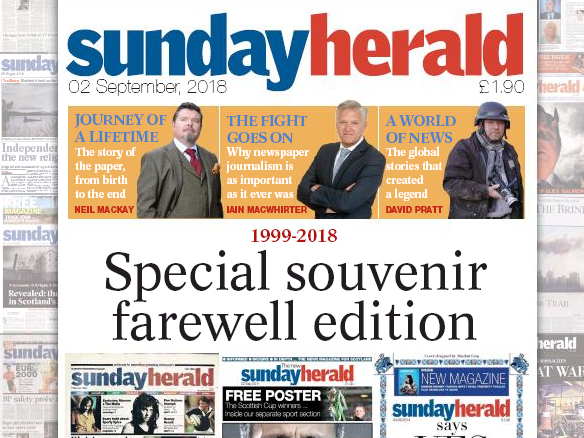
The Sunday Herald published a farewell souvenir edition yesterday as it closed after 19 years.
Newsquest announced last month that the title would shut down to make way for a seven-day offering of the Herald, with “closer alignment of the brand and the title’s editorial values on a Sunday”.
The publisher will launch The Herald on Sunday and the Sunday National this weekend in an apparent aim to consolidate the Herald’s pro-unionist stance, in contrast to the pro-independence National newspaper.
The Sunday Herald was the first newspaper in Scotland to publicly back Scottish independence ahead of the 2014 referendum. The daily Herald was in favour of Scotland remaining within the United Kingdom.
According to the latest ABC data, released last week, the Sunday Herald’s circulation had fallen 18 per cent year-on-year to 16,345. Editor Neil Mackay stood down last month.
The final Sunday Herald front page featured a backdrop of some of its most memorable covers over the past two decades, including the edition in which it declared its support for a “Yes” vote on Scottish independence.
It also featured the splash in which it revealed footballer Ryan Giggs had taken out a super-injunction to stop the media reporting on his affair with former Big Brother contestant Imogen Thomas.
The paper argued that the order was censorship of the press, although it was free to identify Giggs in Scotland. Giggs was eventually outed in Parliament by an MP and later dropped the claim to anonymity.
Editor Neil Mackay, who stepped down last month, said in a comment piece that it was “one of the crowning achievements” of his predecessor Richard Walker’s editorship, “putting the Sunday Herald at the centre of a national debate about wealth, privacy and privilege”.
Scottish First Minister Nicola Sturgeon wrote for the final edition of the Herald, out yesterday, saying the newspaper had added a “distinctive voice to Scotland’s national life”.
Sturgeon praised the title for how it “kept pace with the ups and downs of Holyrood”, “stood out from the crowd”, was “visually daring”, and “turned over its pages to a diversity of voices”.
She wrote: “…the people of Scotland need and deserve critical and informative analysis from the print press.
“We should lament the death of any newspaper, and likewise welcome new titles to the fore as the Scottish Parliament faces its biggest challenge yet.
“My hope is that, like the Sunday Herald, the new Sunday National can provide a platform for debate and give us food for thought on the many hugely important issues facing Scotland today.”

Sunday Herald final wrap on 2 September 2018.
Walker, who was the National’s launch editor, will edit the new Sunday National.
He wrote this weekend that there would be “much that is familiar from the Sunday Herald” in the new Sunday National, including names like foreign correspondent David Pratt, some familiar visual design, and “certainly the same ethos and attitude”.
“The same commitment to presenting news in an interesting and challenging way, to celebrating Scotland’s contribution to the world, to reflecting a confident nation well able to take charge of its own destiny,” he wrote.
“So if tomorrow will be a day to mourn among those who worked on the Sunday Herald and those who read it, trusted it and loved it, next Sunday will be a day to celebrate the story continuing.”
In the final edition, Mackay wrote about the newspaper’s birth, from its beginnings as Project White in 1998 – a “top secret scheme to cook up a new paper for a new century, a newspaper that would go on to define modern Scotland”.
Politics and investigations editor Paul Hutcheon looked back on the newspaper’s political journey, while political commentator Iain Macwhirter wrote about the challenges facing traditional journalism, including the “social media free-for-all”.
Macwhirter wrote: “When I started writing for the Sunday Herald at its launch in 1999, I was repeatedly told that it would only last six months. Well, it survived a bit longer than that.
“Indeed, the longevity of the printed press, despite repeated predictions of its imminent demise, tells us something about the enduring importance of what used to be called ‘quality’ journalism.
“In the era of fake news, Twitter storms and identity politics, the press for all its many faults still performs an important function, which is sometimes just to be a voice of relative sanity in a sea of emotional madness.”
He added that the Sunday Herald “always saw itself in the forefront of progressive ideas” and that despite upsetting some readers with its pro-independence stance in the 2014 referendum, it “at least ensured a minimum of diversity in press coverage of that most important debate”.
“And it’s not over till it’s over. The Sunday Herald is not dead, it has simply evolved,” Macwhirter added.
“There will now be two quality newspapers on Sunday: the Herald on Sunday and the Sunday National. The one becomes two. What better way to demonstrate that, no matter what the internet says, serious journalism is not dead.”
The newspaper also ran 30 of the most powerful photos taken by its staff photographers over the years and published messages of support from a number of Scottish public figures, including actors David Hayman and Elaine C Smith.
Email pged@pressgazette.co.uk to point out mistakes, provide story tips or send in a letter for publication on our "Letters Page" blog
